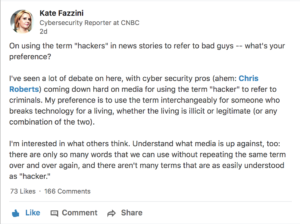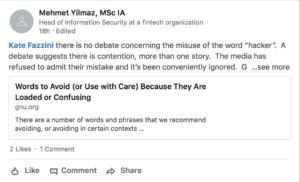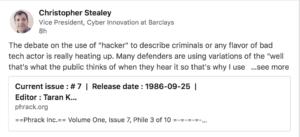An ongoing conversation in the Information Security community, or hacker community, or Cyber Security community, is all about what we should call things, people, etc. You can see this in the first sentence. I have written about this before I am sure, but over the last few weeks I have seen an uptick in what this or that word means and what words we should use instead. As an example we have recent LinkedIn conversations about the use of the word “hacker”.



The word “hacker” is constantly being debated, as well as if they wear black hoodies (hint: just like everyone else, some do, some don’t). I am going to try, as many others have before me, to add some context to the ongoing discussion.
An early reference to the word “hacker” comes from gnu.org, and says that a hacker is someone that enjoys playful cleverness. It doesn’t call out computers, networks or any technology. You can be a food hacker, or a film hacker, or anything else. I think this use of the word was behind the movie Hackers from 1995. The characters were playful, creative, and just wanted to have fun.

Another reference to hackers comes from the “The Conscience of a Hacker”, or as it is commonly known “The Hacker Manifesto”. In it, Loyd Blankenship, aka The Mentor, explains what it means to him to be a hacker. He describes the freedom, curiosity, connections and unity of being a hacker, “after all, we’re all alike.” I find it still relevant today.
Bugcrowd put out a blog this week in which they try to define the word hacker. I think they do a good job of summing up a lot of the issues, and I appreciate their Burglar/Locksmith == Cybercriminal/Hacker analogy. We as an industry and community have tried to find alternatives to the word “hacker” for the media and others to use when describing cybercriminals. Sadly, hacker is sexier than cracker and will always get more clicks.
To add more to our naming crisis, we run into hurdles describing what we do as hackers. In a recent Paul’s Security Weekly there was a discussion about pentesting, red teaming and others and what they all actually mean. When engaging with customers I also find that not all of them understand the differences between penetration testing and red teaming. Because the industry is always evolving we see new companies coming out claiming to do one thing, but really it is something else but because they can sell off of the misunderstanding they do.
We see the same confusion over EDR, Threat Intelligence, Machine Learning and Artificial Intelligence. It is no wonder that people outside our industry have no idea what we do, when those of us inside it can’t agree on what to call our solutions or even ourselves. I am not even going to get into the issue with our job titles because the “Am I an Engineer? Am I an Architect? Senior? Principal? Staff?” debate, which leaves our customers and peers with no idea of what we do drives me crazy.
In the end, what is in a name? A lot! Use your words carefully, because they can mean many different things to many different people.
Updated: Motherboard has also commented on the word “hacker” and wants to change the definition of it. From their glossary:
“Hackers can now be used to refer to both the good guys, also known as white hat hackers, who play and tinker with systems with no malicious intent (and actually often with the intent of finding flaws so they can be fixed), and cybercriminals, or “black hat” hackers, or “crackers.””
I have a feeling this won’t be the last article we read about the definition of hacker.